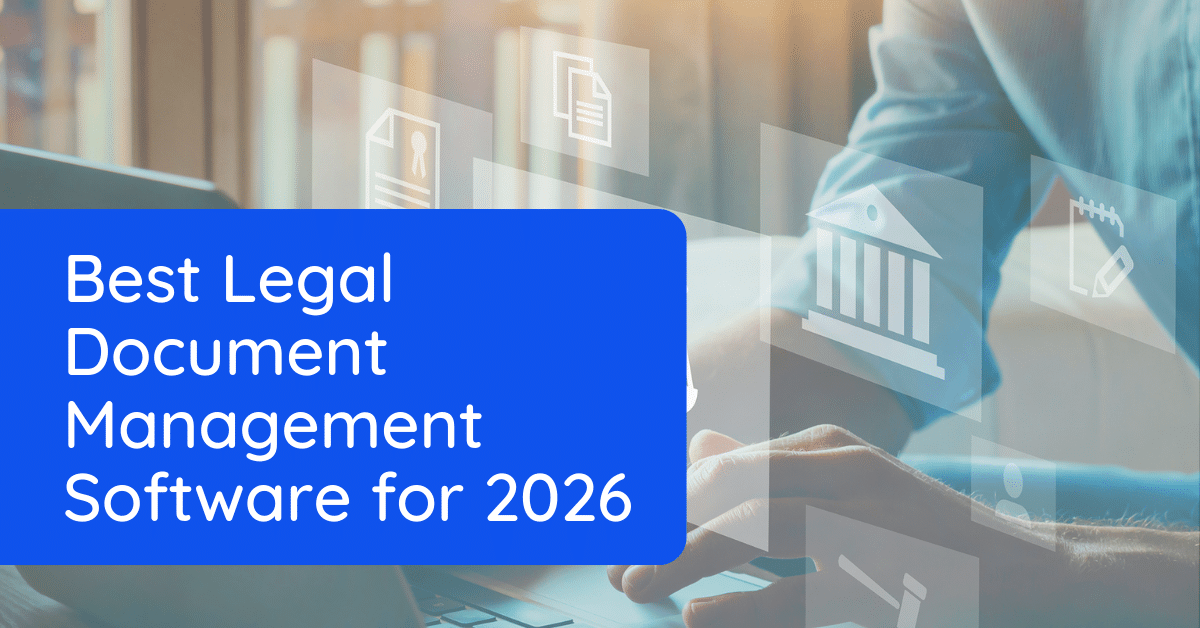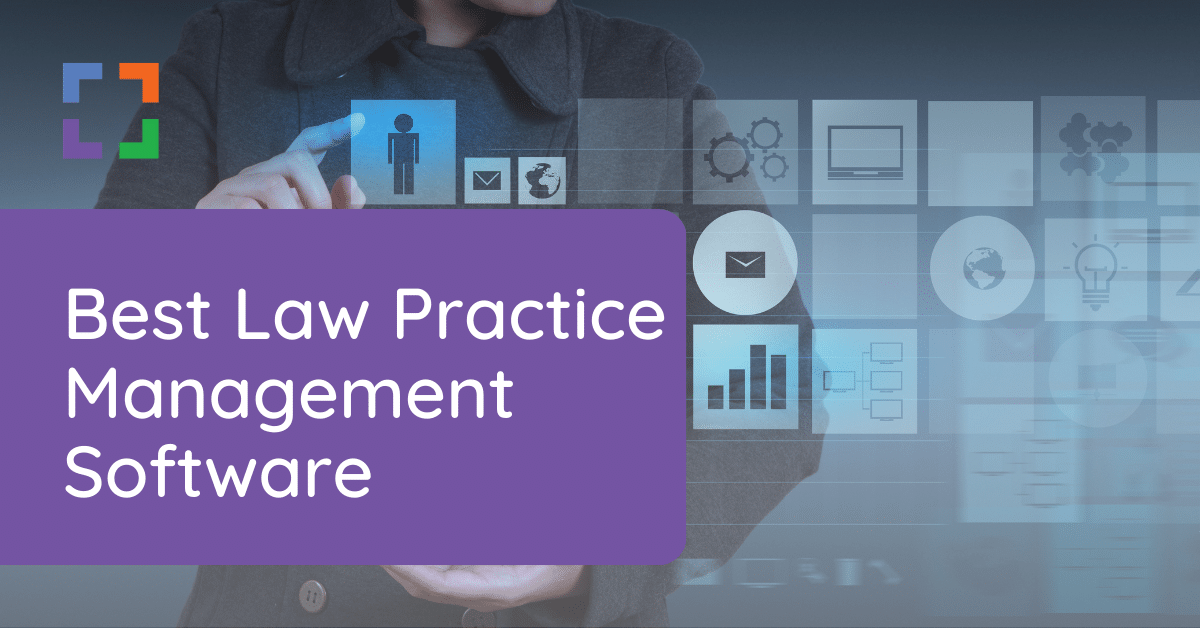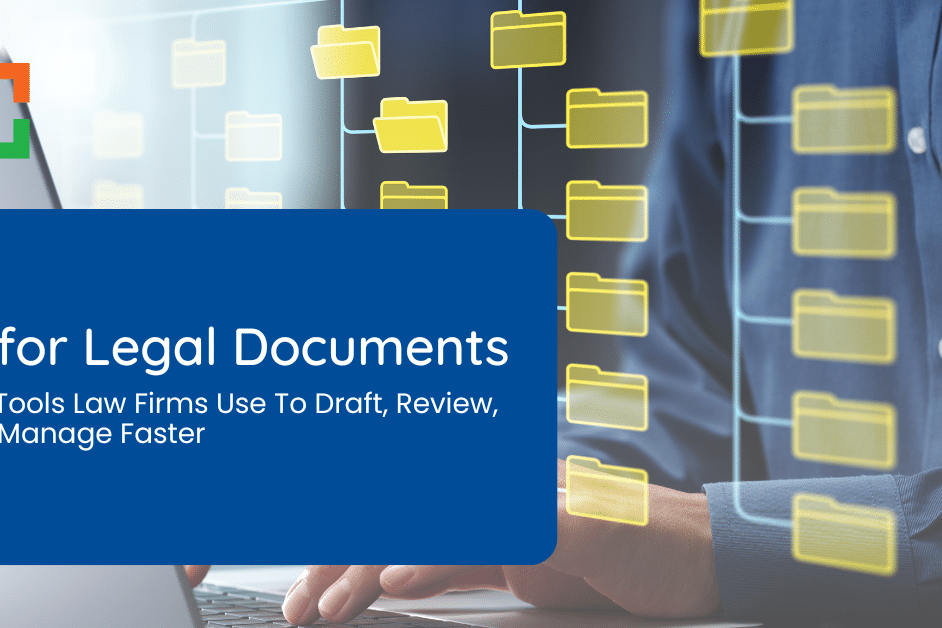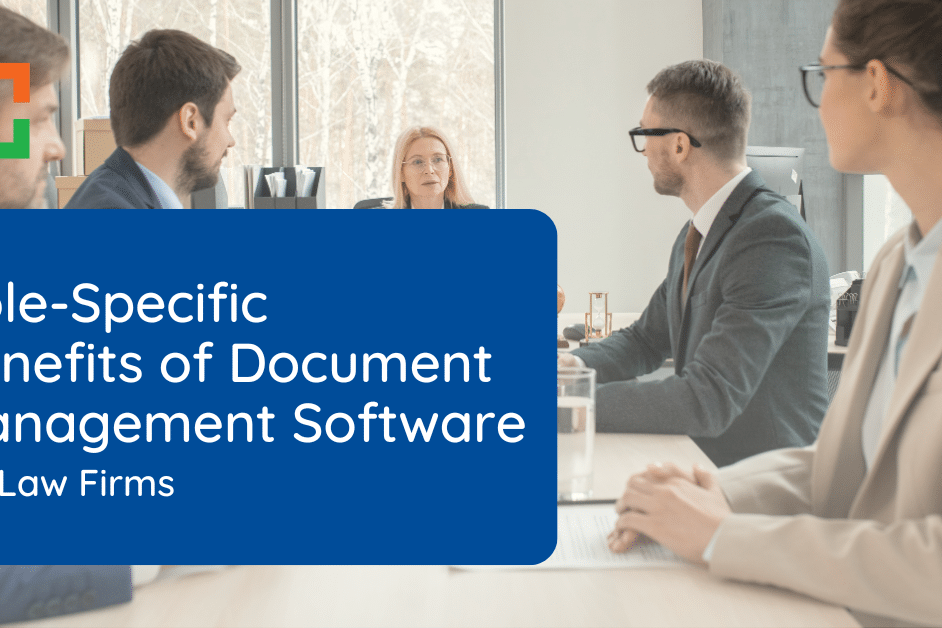What is Legal Matter Management Software?

Due to this confusion, this article embarks on answering one major question: What is legal matter management?
Through the answering of this question, we will explain what benefits you can expect, your best options for both definitions used, and what steps your law firm can take next.
As you read through the article, ensure that you take the time to understand which software your firm really needs and which option best suits those needs.
Law Practice Management (LPM) software and Document Management Software (DMS) can both be thought of as Legal Matter Management. Which you need for your law firm, however, will depend on what features you’re looking for. Let’s dive in!
In This Article
- What is Legal Matter Management?
- Matter Management vs. Case Management
- Benefits of Legal Matter Management
- Types of Legal Matter Management
- Document Management Software (as Matter Management)
- Legal Practice Management Software (as Matter Management)
- Next Steps for Your Law Firm
- Frequently Asked Questions
What is Legal Matter Management?
Legal matter management, often simply referred to as “Matter Management,” pertains to the systematic processes and tools that legal professionals use to organize, track, and manage legal cases or projects.
This specialized discipline within the broader field of legal management ensures that all elements associated with a legal case — from initial intake to final resolution — are efficiently handled and thoroughly documented.
Key components and purposes of legal matter management include:
Centralized Repository
This is a singular place where all details, documents, and communication about a legal case are stored. Having a centralized repository allows law firms and legal departments to maintain consistency, ensure accuracy, and provide easy access to relevant information when needed.
Case Tracking
A key feature of matter management is tracking the progress of cases. This includes monitoring key dates, milestones, court hearings, and ensuring that tasks are completed in a timely manner.
Document Management
Legal cases often involve voluminous documentation. A good matter management system allows professionals to store, organize, and easily retrieve these documents.
Compliance and Risk Management
With various regulations and rules governing the practice of law, matter management can play a critical role in ensuring that professionals adhere to these guidelines, thereby mitigating risks of violations.
Collaboration
Modern matter management systems often have features that allow multiple legal professionals to collaborate on a case, share notes, and maintain unified communication.
Client Communication
Keeping clients informed about the progress and developments in their cases is a fundamental aspect of legal service. Matter management tools may include features to facilitate consistent and organized communication with clients.
Reporting and Analytics
Advanced matter management systems offer data analytics and reporting features, enabling law firms and legal departments to draw insights, identify trends, and make data-driven decisions.

Legal Matter Management stands as a cornerstone of modern legal practice, reflecting the intersection of traditional legal expertise with the advantages of contemporary technology.
It not only streamlines and organizes the multifaceted aspects of legal matters but also ensures a more transparent, consistent, and proactive approach to serving clients.
As technological innovations continue to shape various industries, legal professionals who embrace and integrate advanced Legal Matter Management tools will be better positioned to meet the dynamic needs of clients, adapt to the evolving legal landscape, and maintain a competitive edge in their practice.
Matter Management vs. Case Management
While both matter management and case management are essential in legal practices, they serve distinct roles.
Matter management involves overseeing all aspects of a legal matter, including documents, timelines, billing, and contacts. It’s comprehensive, focusing on the lifecycle of a legal matter from start to finish.
On the other hand, case management is more narrowly focused on the litigation aspect of legal practice. It includes tracking court dates, filings, and interactions specifically related to the legal proceedings of a case.
Understanding the difference helps law firms optimize both operational efficiency and legal outcomes. It’s also helpful to have this information when you’re having discussions about various software and trying to decide upon software for your law firm.
Some matter management systems are equipped to handle case management functionalities; however, specialized case management software may be needed for more detailed litigation tracking.
Distinguishing the two helps law firms optimize workflows, enhance efficiency, and better manage client expectations and legal outcomes.
The choice depends on the firm’s needs: matter management for comprehensive practice management or case management for focused litigation handling.
Related – Law Firm Software: We maintain this comprehensive list of law firm software to assist law firms in choosing the best options of various categories.
Benefits of Legal Matter Management
Legal Matter Management systems are indispensable tools for modern law practices. Whether a solo practitioner or a multinational law firm, leveraging these tools can significantly enhance the efficiency and quality of legal service delivery.
Here’s an exploration of the benefits of Legal Matter Management:
Enhanced Organization
One of the primary advantages of matter management systems is the way they streamline and centralize case-related information.
Instead of sifting through stacks of paper or disparate digital files, lawyers can access a unified database, making case handling more systematic.
Time Efficiency
With automated task reminders, calendar integrations, and efficient document retrieval systems, legal professionals can save valuable time, ensuring they remain focused on the core aspects of their practice.
Improved Client Relations
Regular and organized communication facilitated by matter management tools can significantly improve client satisfaction. When clients are kept in the loop and receive timely updates, it fosters trust and strengthens the attorney-client relationship.
Financial Accuracy
Integrated billing and time-tracking features ensure that every billable hour is accounted for. This not only guarantees accurate invoicing but also minimizes disputes over fees and services rendered.
Risk Mitigation
When documents and matters are handled properly, the risk of mistakes made during the process decreases. This reduces the risk of malpractice suits and enhances a firm's reputation for reliability.
Collaborative Efficiencies
Especially in larger firms or in cases that require interdisciplinary expertise, matter management tools enable seamless collaboration.
Shared notes, task assignments, and unified communication channels promote teamwork and ensure everyone is on the same page.
Data-Driven Decisions
With analytics and reporting functions, law firms can gain insights into their operations.
This can guide decision-making, from resource allocation to business development strategies, based on tangible data.
Scalability
As a practice grows, so does its volume of cases and complexity.
Legal Matter Management systems can scale accordingly, ensuring that even as demands increase, the quality of service remains consistent.
Secure Data Storage
Modern Legal Matter Management platforms often come with robust security features, ensuring that sensitive client data and critical case documents are safeguarded against unauthorized access, data breaches, or loss.
As you can see, the benefits of Legal Matter Management are plentiful.
It’s difficult to come up with any downsides to pursuing this software because the pros outweigh any proposed cons — at every turn. Keep these benefits in mind, and perhaps even choose your favorites, as you determine the best route for your firm to take.
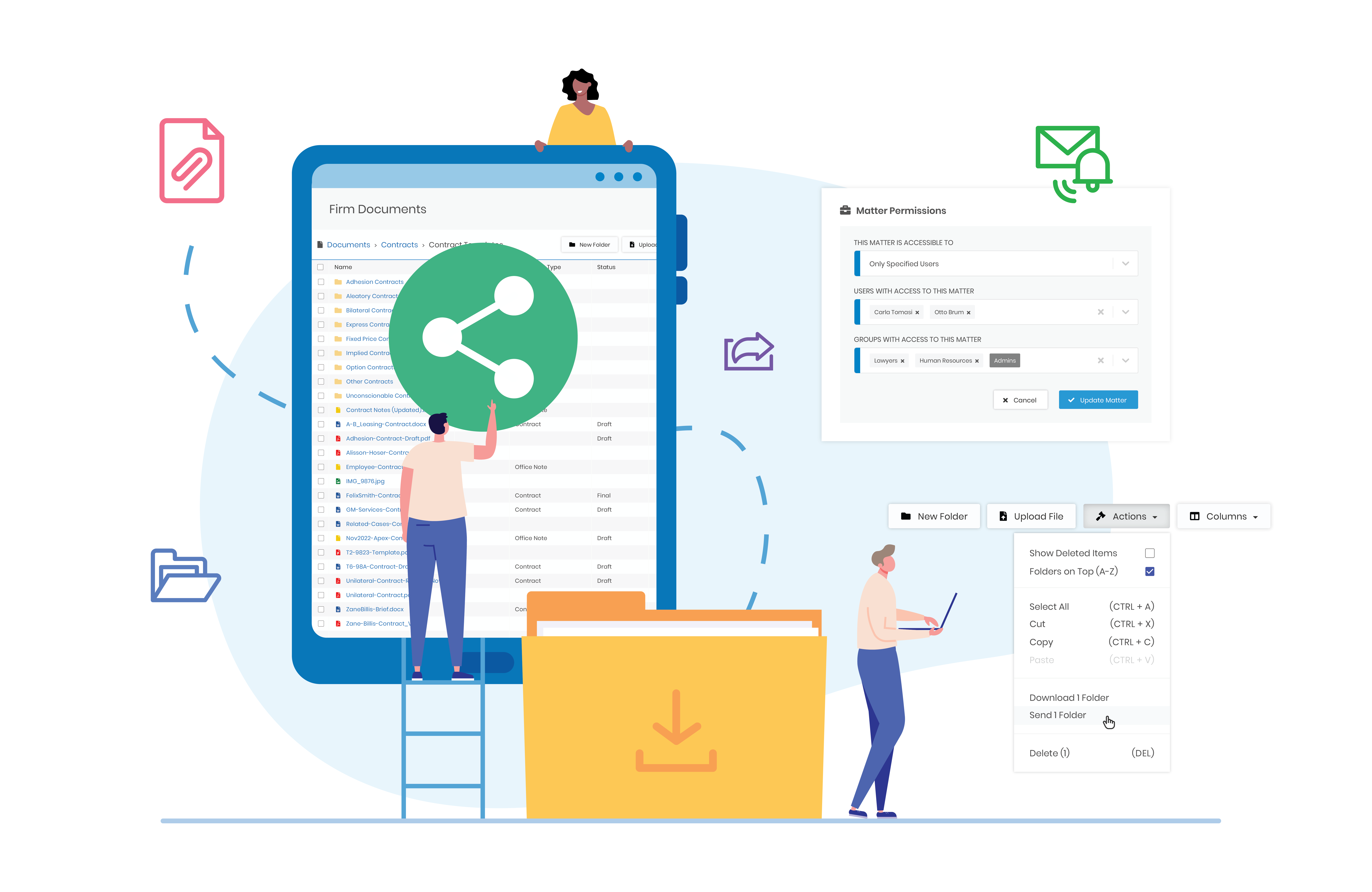
Types of Legal Matter Management
When I say Legal Matter Management, what comes to mind?
Maybe you have never heard of Legal Matter Management.
Maybe you think of Document Management Software, which provides features like:
- Document Storage
- Email Management
- Version Management
- Index/Search
- Tagging
Maybe you think of Practice Management Software, which provides features like:
- Time
- Billing
- Client/Contact Management
- Calendaring
- Docketing
- Form Generation
Regardless of what you envision… you’re not wrong.
Legal Matter Management, depending on who you ask, describes either type of software and, in some cases, both. For the purpose of this article, we want to be inclusive of the various definitions used, so we will discuss both!
At the end of the day, Legal Matter Management describes software that helps you handle matters in a meaningful way.
How exactly it helps you is based on which software you’re looking for and decide to utilize.
Different firms require different software.
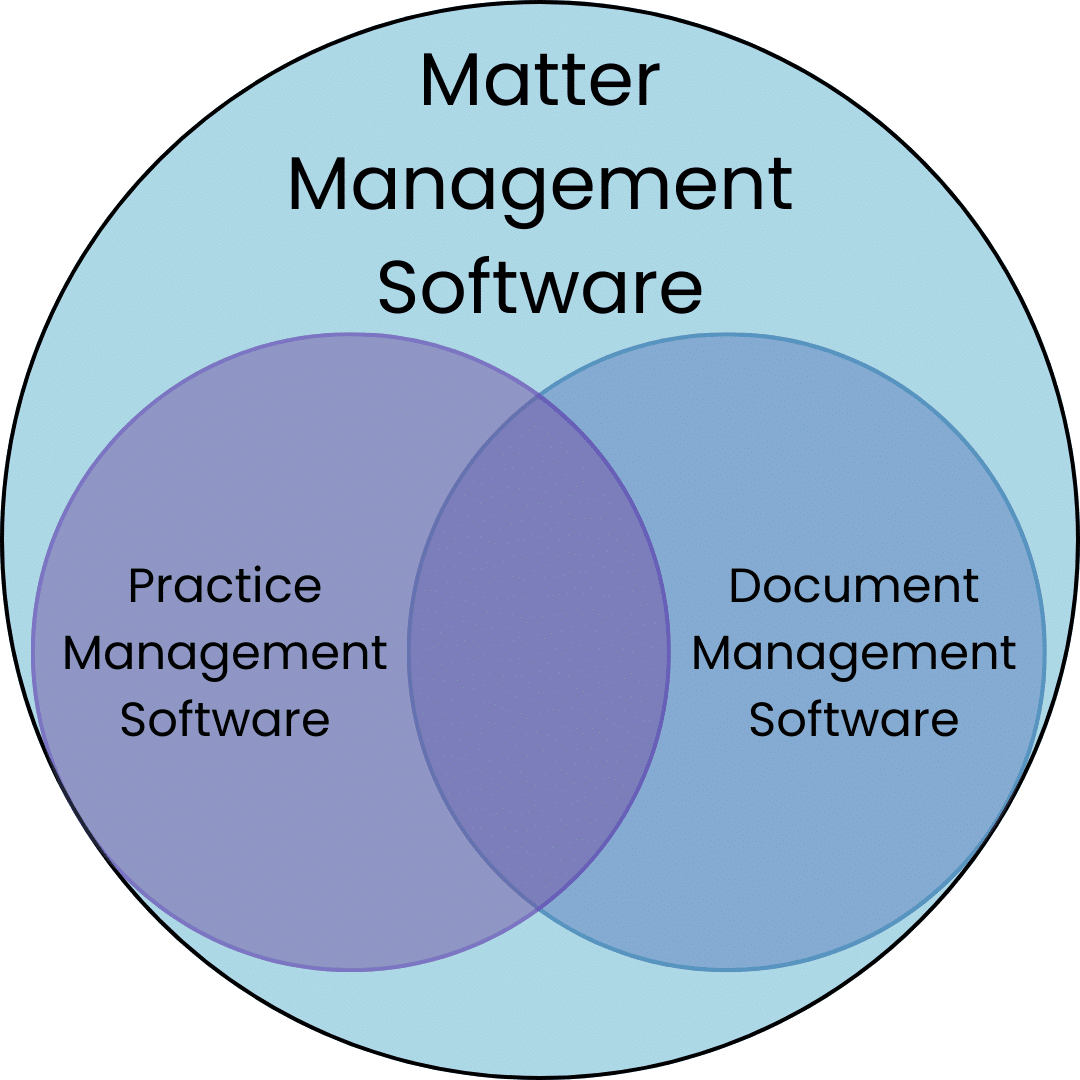
Sidebar: Choosing Between Practice Management vs. Document Management
Practice Management software excels in overseeing your firm’s time tracking, billing, calendar appointments, contacts, and tasks. Some of these platforms may offer basic Document Management features.
However, it’s essential to differentiate between Practice Management and Document Management. Before adopting any new Practice Management software, ensure you’re clear on your firm’s document management goals.
Related:
Document Management Software (as Legal Matter Management)
Before diving into our top recommendations for Legal Document Management Software, it’s essential to clarify what exactly this category entails. The term “Document Management” is often loosely used to describe various software and services, but not all of them fit the bill.
Legal Document Management Software, also referred to as a Document Management System (DMS), is a platform – whether cloud-based or on-premise – that doesn’t merely store your law firm’s documents. Rather, it equips you with an extensive toolkit to efficiently locate, categorize, and handle these documents.
This differs significantly from simple file storage solutions that mainly serve as repositories for your files. It’s also distinct from law practice management tools that might offer rudimentary document storage functionalities.
For clarity’s sake, let’s distinguish what isn’t a genuine Legal Document Management Software:
- Cloud Storage like OneDrive, Google Drive, and Dropbox don't qualify as Document Management Systems.
- Your in-house File Server (for example, “The S: Drive”) doesn't fit the definition of a Document Management System.
- Practice Management tools that merely incorporate basic document storage aren't Document Management Systems either.
Why Use Document Management Software
Law firms manage vast amounts of sensitive data daily. To streamline this, Document Management Software (DMS) is essential. Reasons to utilize a robust DMS for law firms include:
- Efficiency Boost: Facilitates quick document search and retrieval, leading to improved turnaround times and happier clients.
- Enhanced Security: Offers advanced protections, like encryption and user-level controls, ensuring only approved personnel access crucial documents, thus safeguarding the firm's reputation.
- Regulatory Compliance: Many DMS options come with built-in features ensuring adherence to regulatory standards such as HIPAA and GDPR, lessening potential legal repercussions.
- Cost Benefits: Diminishes expenses related to printing, storage, and manual document handling, providing labor cost savings.
- Structured Organization: Allows precise document sorting by client, case, or other criteria, and tracks document history, which maintains consistency and reduces error risks.

“LexWorkplace is very fast, and documents are easily accessible. Working remotely is seamless.”
Nathan Cobb
Law Offices of Nathan Cobb
See Why Lawyers Love LexWorkplace
Get Organized. Work Anywhere. LexWorkplace is modern Document & Email Management, born in the cloud and built for law firms.
Features to Evaluate from Document Management Software
Such software can be on-premise (installed on local servers) or cloud-based.
While each product offers unique features, generally, a Document Management System (DMS) performs the following functions:
- Document & File Storage
- Document Profiling
- Full-Text Search
- Unique Document ID
- Document Check-Out/In
- Microsoft Office Integration
- Document Version Management
- Access Management
- Pinned Documents
- Matter Notes
- Email Management
Contemporary cloud-based Document Management Systems, like LexWorkplace, often incorporate these advanced features:
- Full Windows & Mac OS Compatibility
- End-to-End Data Encryption
- Multi-Factor Authentication
- Practice Management Integration
- Geographic Data Redundancy
- Limited/Zero Server Responsibility
Now that you have an understanding of what Document Management Software is, let’s cover some of your best options.
LexWorkplace


Free Trial: LexWorkplace Does Offer a Free Trial
LexWorkplace is a cloud-based system that manages documents and emails with a focus on specific matters. Compatible with both Windows and Mac OS, LexWorkplace ensures your documents, emails, and notes are well-organized, indexed, and searchable. It features document versioning, an advanced search function, integration with Outlook for email management, and capabilities for document tagging and profiling.
LexWorkplace Demo + Free Trial
Use this trial to fall in love with our:
- Helpful Demonstration and Assisted Setup
- Optimal Organizational Tools
- Seamless Email Integration
- Effective Document Management
- Included Sample Data and Full Feature Access
Ready to Try the Last DMS You’ll Ever Want?
ProLaw

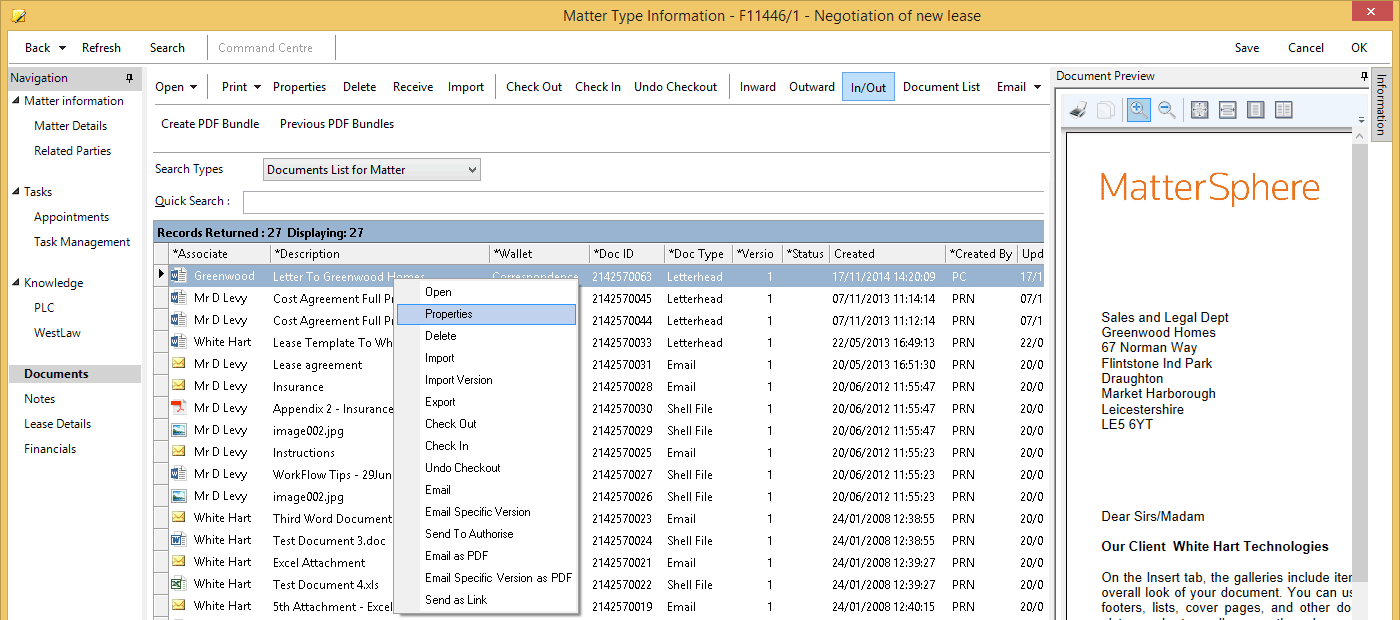
Free Trial: ProLaw Does Not Offer a Free Trial
ProLaw integrates Practice Management, Document Management, and Accounting into one software solution. Although its document management features are more basic than dedicated DMS systems, ProLaw stands unique in offering practice, document, and accounting management within a single platform. However, being server-based, ProLaw necessitates an advanced on-premise server or a strong private cloud setup.
Worldox

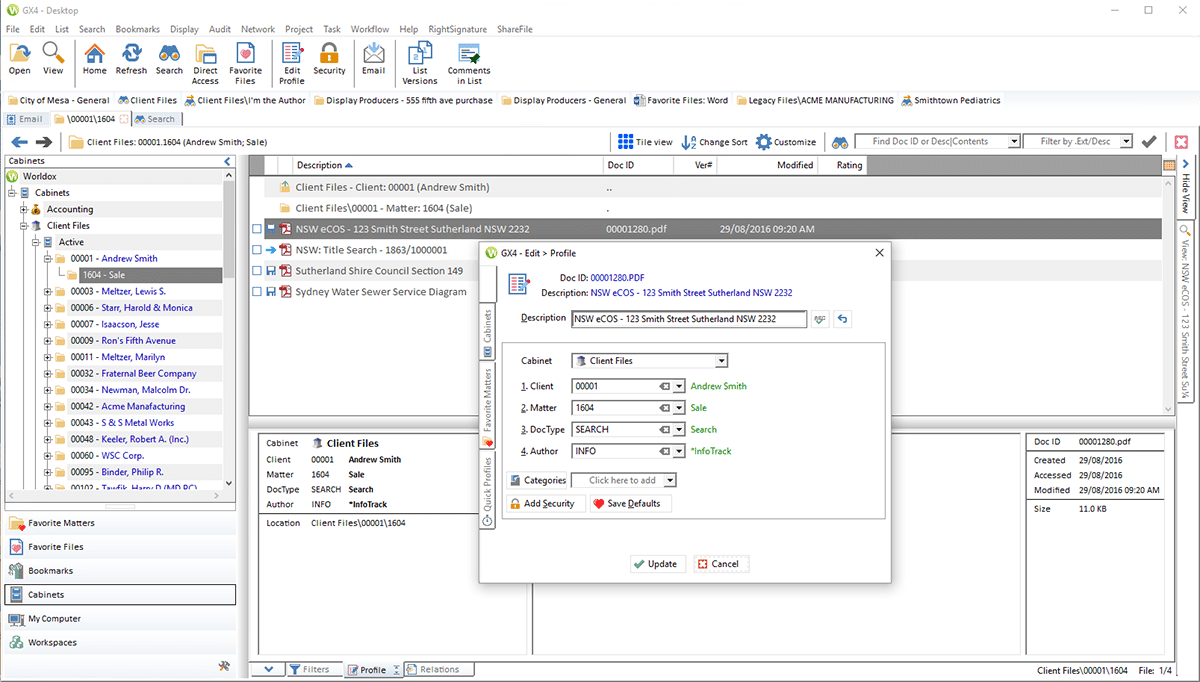
Free Trial: Worldox Does Not Offer a Free Trial
Worldox is a longstanding legal document management platform, standing as one of the pioneer systems in the field. It seamlessly integrates with several on-premise practice management tools. Worldox can operate either on-site or through a hosted server setup. However, it is phasing out, so take this with a grain of salt. For information about the transition, read more here.
Related – Best Legal Document Management Software: We covered a few of your options for a DMS. Read this article for a deeper dive.
Legal Practice Management Software (as Legal Matter Management)
If you’re buried under heaps of spreadsheets and case files, and confined to accessing information only from the office, it’s high time to consider law practice management software.
Top-tier law practice management tools can elevate your firm’s efficiency and productivity by:
- Streamlining Case and Client Record Management
- Synchronizing Billing and Accounting Tasks
- Organizing Schedules and Setting Appointments
- Providing Deadline Reminders
- Ensuring Adherence to Compliance Protocols
- Offering Remote Access Across Various Devices
Signs You Need Practice Management Software
As you’re evaluating your firm’s technology strategy and overall efficiency/efficacy, you may wonder if you really need Practice Management Software.
I’ll start out by saying that even if you don’t feel like your firm is disorganized or has suboptimal performance, there is always room to improve and grow as a company.
With that being said, there are scenarios you can look out for that will confirm that you would not only benefit from Practice Management Software but that you may need to act quickly to ensure smooth operations moving forward. These instances include:
- Struggling to Keep Track of Your Information: Centralizing and organizing your data not only simplifies management and access but also enhances the efficiency of your firm.
- Limited Office-Only Access to Information: Seamless access to documents, regardless of location, is vital for delivering optimal client service and ensuring work-life harmony. Top-tier legal management software achieves this accessibility by transitioning to cloud platforms, eliminating the need for VPNs.
- Lengthy Invoicing and Payment Collection Processes: Investing time chasing payments diverts attention from case management.
- Challenges in Tracking the Latest Document Versions: Quickly finding the most recent version of a collaborative document is crucial for efficient case management.
- Frequent Calls to Your IT Specialist: If your firm is regularly updating its security or dealing with server issues, consider a cloud-based practice management system.
Features of Legal Practice Management Software
Often, we’re posed with the question, “Which law practice management software is the best?” It’s akin to asking about the best car – the right choice depends on your specific requirements.
For example, certain Legal Practice Management Software might emphasize accounting. If your firm is already settled with its accounting software, such a feature might not appeal to you. Others prioritize document and form generation, which, while crucial for some, isn’t necessary for all.
Our advice to any law firm exploring these software options is to first pinpoint the essential features you require. Doing so not only refines your choices but also establishes a criteria to evaluate potential options. Some of the features to consider include:
- Client & Contact Management
- Matter Management
- Calendaring
- Task Management
- Time & Expense Tracking
- Conflict Checking
- Business Accounting
- Trust Accounting
- Document Assembly/Automation
- Document Storage
- Document Management
- Email Management
- Mobile App
- Open API
- Client Portal
- Billing
Now that we’ve covered the reasons to utilize Practice Management Software and the features to look out for, let’s talk about some of your best options.
Keep in mind that there are 25+ options to consider, so this list consists of a few of the most popular options:
Clio

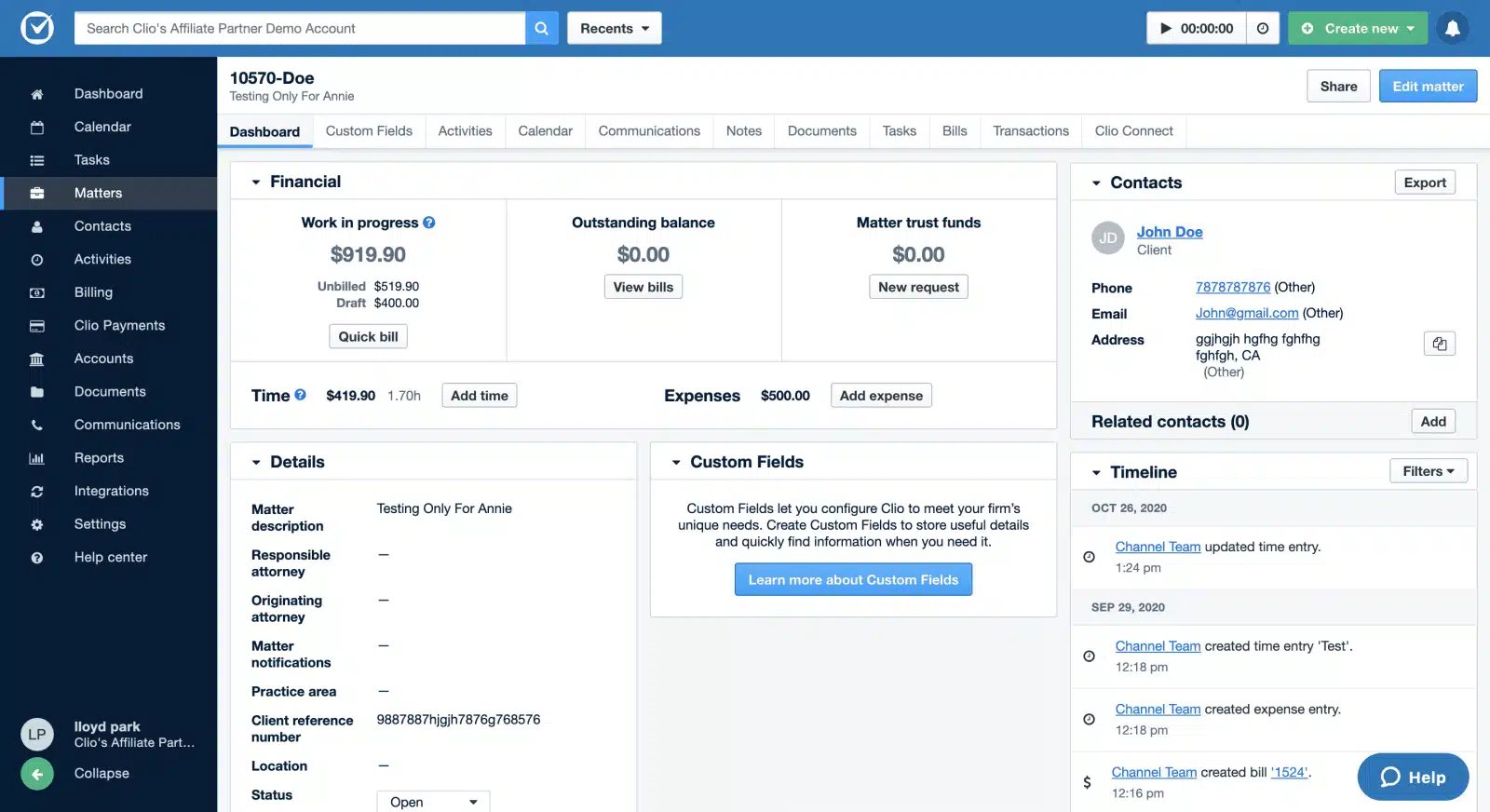
Free Trial: Clio Manage Does Offer a Free Trial
This user-friendly, cloud-driven LPM is designed to serve as the backbone for your law firm. Impressively, it boasts a wide range of app integrations, allowing for seamless integration into your law firm’s tech approach. Additionally, a client portal is available.
LEAP

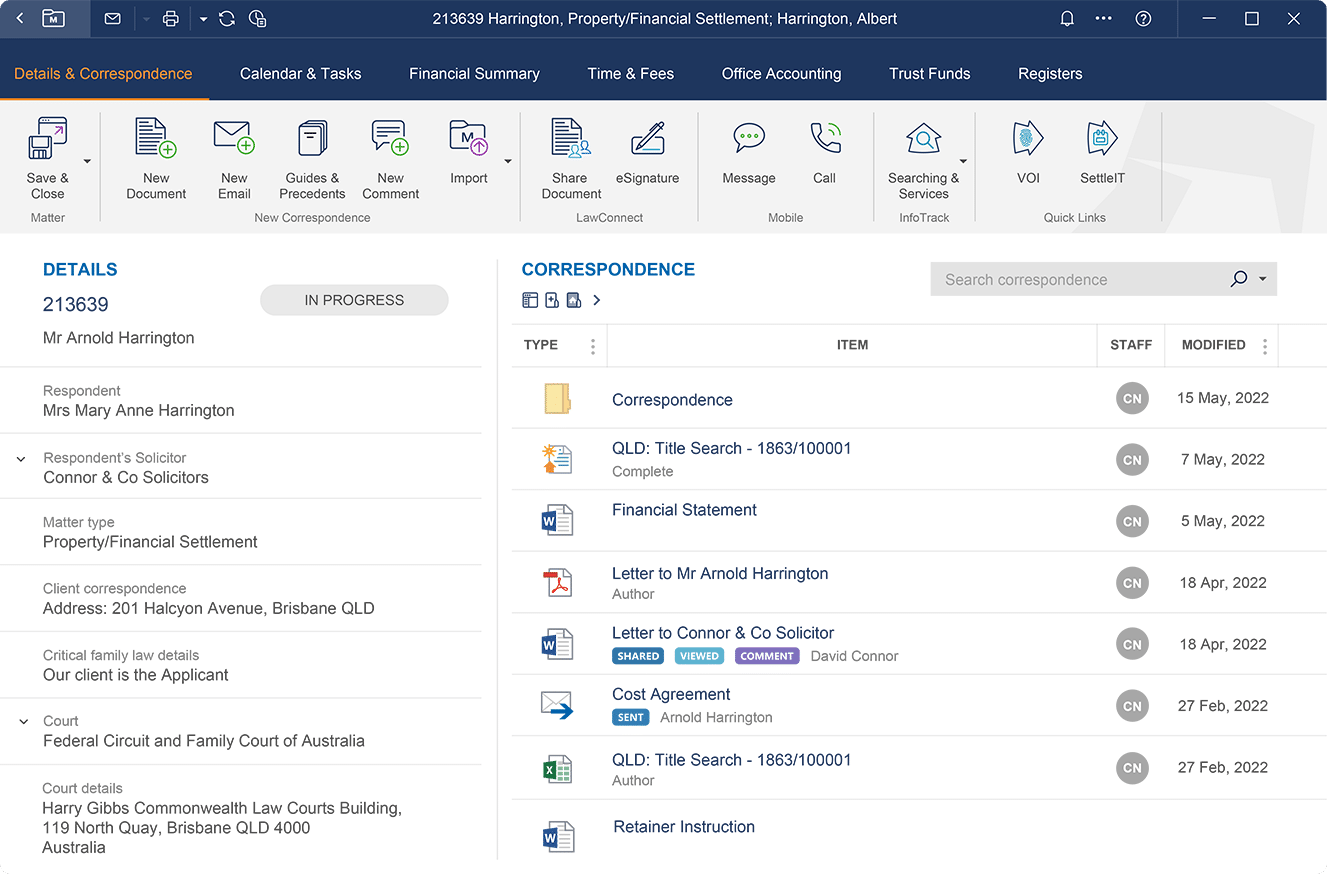
Free Trial: LEAP Does Not Offer a Free Trial
Among the cloud-based solutions, this software distinguishes itself as one of the most potent tools. Its document automation is particularly commendable, boasting an extensive collection of forms.
Time Matters
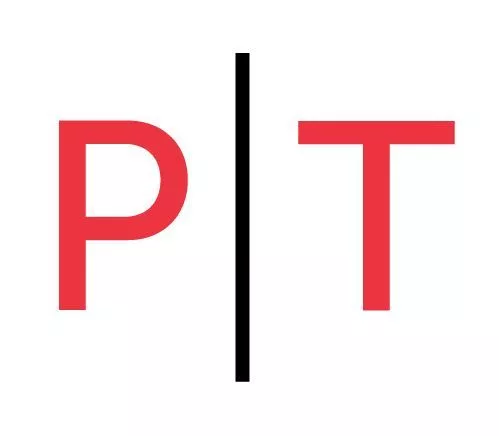
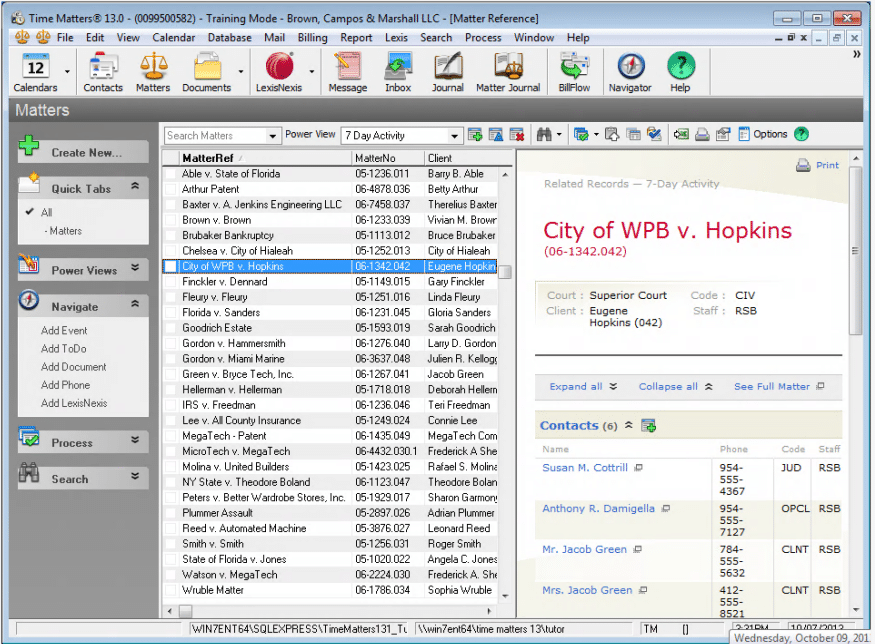
Free Trial: Time Matters Does Not Offer a Free Trial
This server-based software effectively serves as an LPM, incorporating certain Document Management features. Its hallmark is the flexibility it offers law firms for customization.
Related – Best Law Practice Management Software: With 15 applications discussed and overviewed, take a deep dive with us.
Next Steps for Your Law Firm's Legal Matter Management
When you came to our article on Legal Matter Management, you were likely thinking of Document Management or Practice Management Software.
Whichever software you had in mind, hopefully this guide gave you some insight into the best way to handle matters for your firm.
Remember that oftentimes, there’s not a one-size-fits-all solution. Having a technology strategy that works well for your firm will require some investigation into your firm’s needs and discussion with others.
Related – 2023 Legal Software Report: Our annual report covering Legal Software in multiple categories (and more!)
Frequently Asked Questions - Legal Matter Management
Legal Matter Management software is a term that is used to describe Legal Practice Management Software and/or Document Management Software.
Ultimately, it is a comprehensive tool that helps law firms oversee various facets of their operations, from managing client records and invoicing to streamlining case handling and ensuring compliance with legal standards.
Cloud-based management software allows for enhanced mobility, enabling lawyers to access essential documents and information from anywhere. It also offers better security protocols and minimizes the technical responsibilities typically handled in-house, as most are managed by the software provider.
For this reason, consider LexWorkplace, a cloud-based Document Management Software.
The software centralizes information, streamlines invoicing, automates payment collection, ensures quick access to updated documents, and facilitates compliance, leading to improved productivity and reduced errors.
Firms should first identify the essential features and functions they require. This will help them narrow down their choices and establish criteria to evaluate potential options, ensuring they select a platform tailored to their needs.
Yes, many Legal Matter Management systems offer customizable features to cater to a firm’s unique needs. Whether it’s tailoring specific workflows, adding custom fields, or integrating with other software, these systems can often be adapted to fit the firm’s operational style.
With features such as real-time document collaboration, centralized data storage, and streamlined communication tools, Legal Matter Management software makes it easier for teams to work together, share insights, and stay updated on case progress.
As with any software, there’s a learning curve. Some firms may find the transition challenging, especially if they’re moving from manual processes. Additionally, ensuring data migration is smooth and complete can be a concern. However, the long-term benefits of improved efficiency, security, and collaboration often outweigh these initial challenges.
Looking for Document Management Software?
LexWorkplace:
Modern Document Management for Law Firms
LexWorkplace is document & email management software, born in the cloud and built for law firms. Here’s a quick primer on how it works, or get your free trial to discover LexWorkplace for yourself.
Organize by Client & Matter
Organize documents, email and notes by client or matter. Store and manage all data for a case or project in one place.
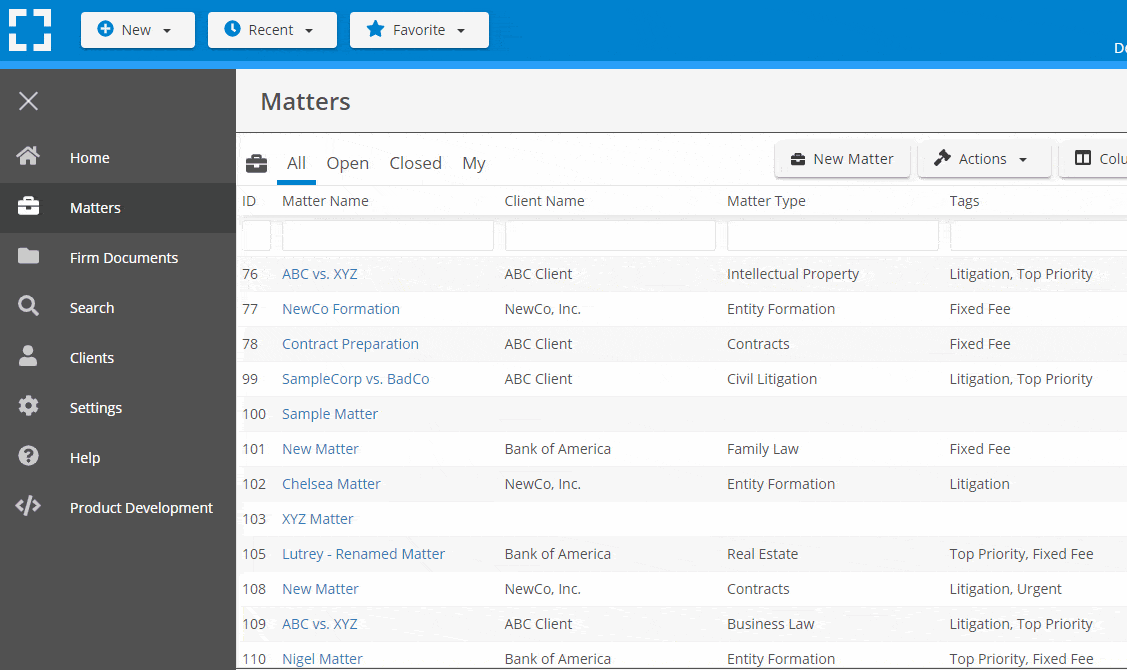
Go Beyond Basic Files & Folders
Supercharge your firm’s productivity with true DMS functions.
- Version Management
- Document Tagging & Profiling
- Document Check-Out / Check-In
- Microsoft Office Integration
- Automatic, Integrated OCR
- Convert Word Docs to PDF
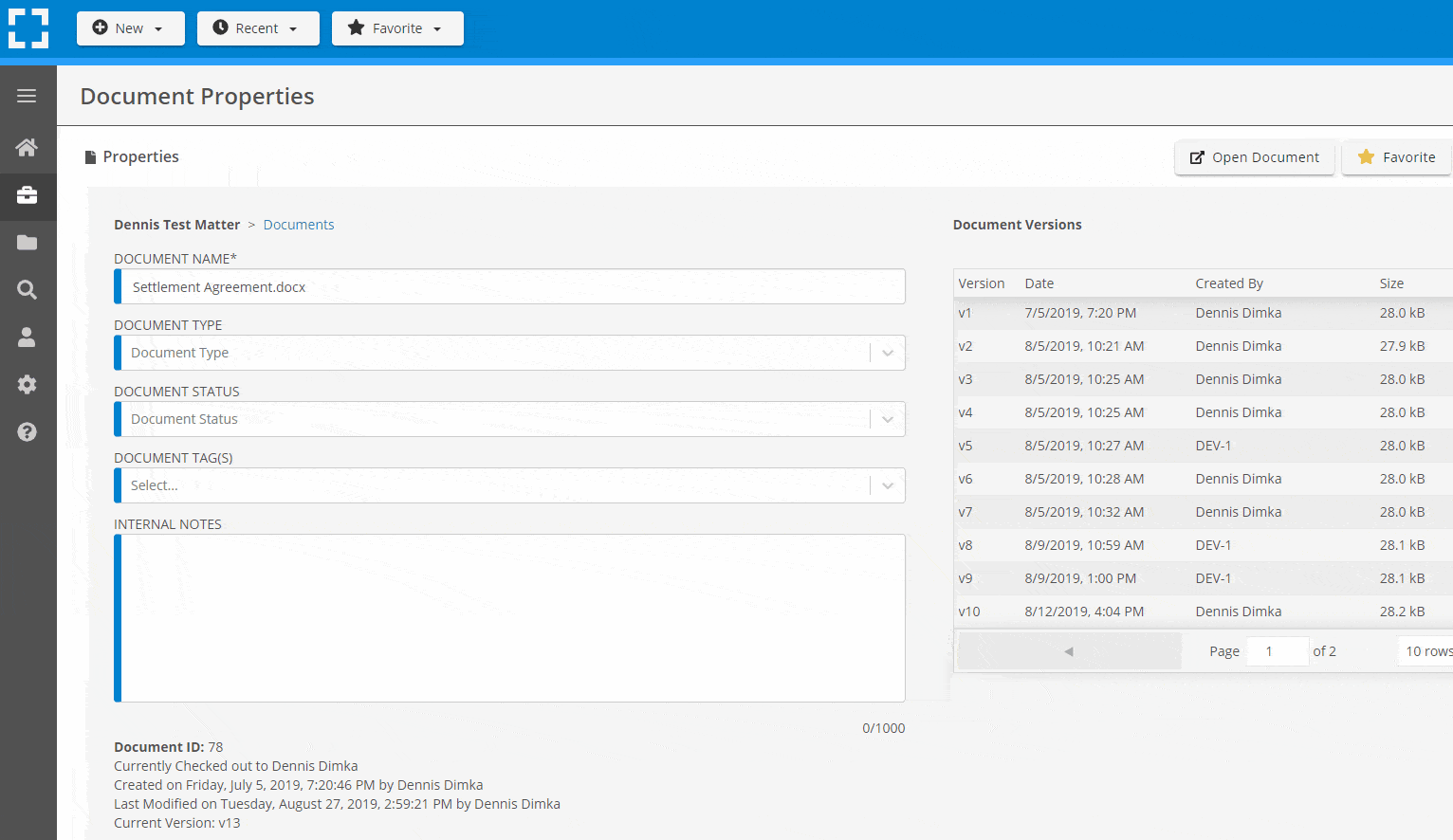
Search Everything
LexWorkplace is like Google for your law firm. Search across millions of pages, documents, folder email and notes in seconds. Refine your search by matter, document type, author and more.
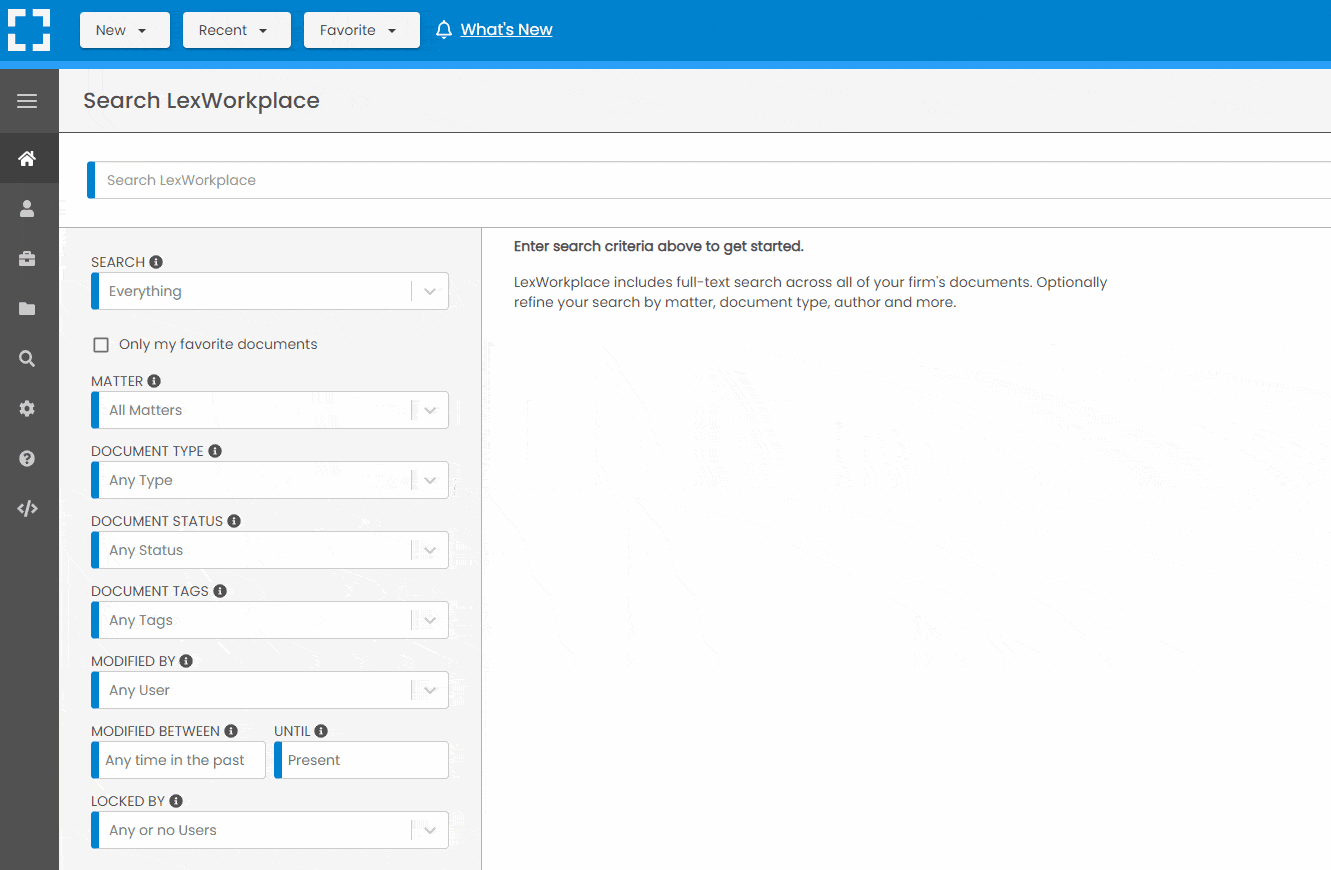
Search by…
- Client or Matter
- Document Type (Contract, Complaint, Order, etc.)
- Document Status (Draft, Final, etc.)
- Document Tags (Filed With Court, Fully Executed, etc.)
Outlook Integration + Comprehensive Email Management
Save emails to a matter without leaving Outlook. Saved emails are accessible to your entire team, organized and searchable.
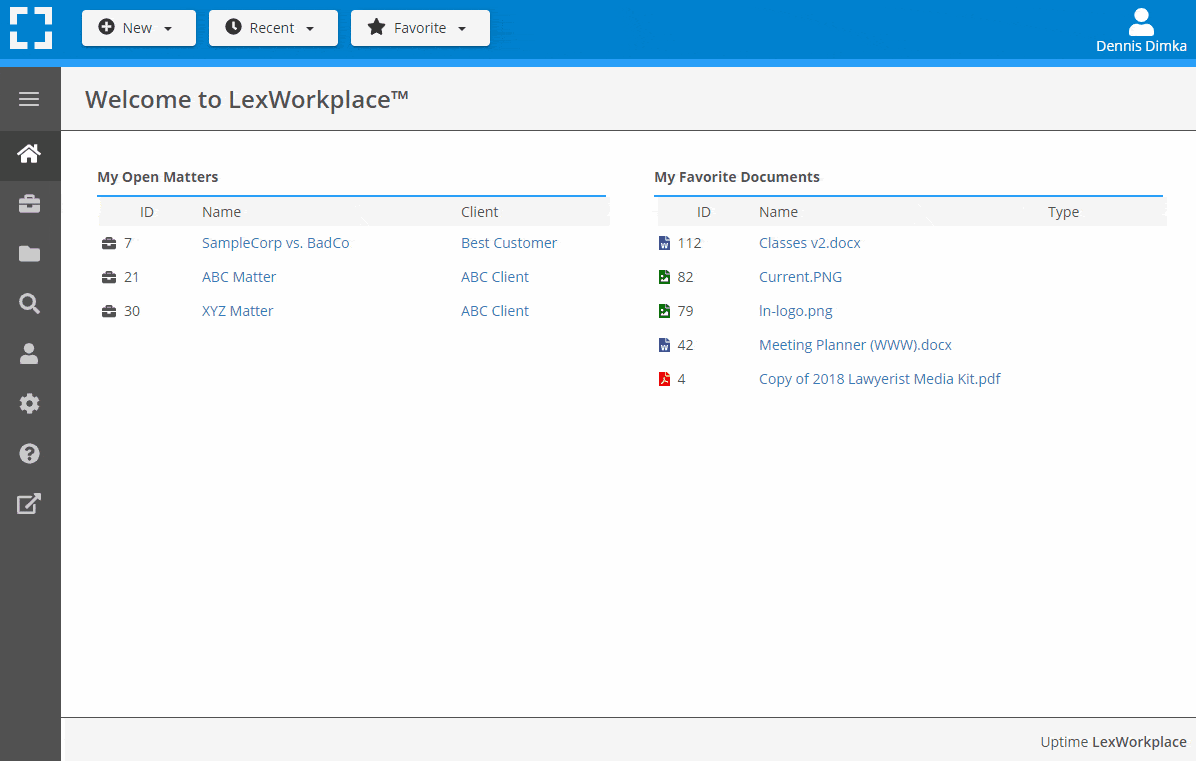
- Outlook Add-In that Works With Windows and Macs
- Save Entire, Original Email to a Matter in a LexWorkplace
- Email De-Duplication
- Organize Emails into Folders, Subfolders
Works with Windows and Macs
All of LexWorkplace is compatible with both Windows and Mac computers.
Next Steps
See What Clients Have to Say
Lawyers love LexWorkplace. See how the system streamlined one lawyer’s practice.
Watch the 5-Minute Demo
See LexWorkplace in action in our quick 5-minute overview and demonstration.
Or, if you want a one-on-one demo, or want to talk about LexWorkplace for your firm, schedule a call or demo below.
You Might Also Like
August 19, 2025
AI for Legal Documents: Top Tools Law Firms Use To Draft, Review, and Manage Faster
Struggling with slow legal document…
August 12, 2025
Why Law Firms Can’t Afford to Delay DMS Migration — And How to Switch Smoothly
Tired of costly, stressful tech…
June 23, 2025
Role-Specific Benefits of Document Management Software for Law Firms
Legal document management software…
Want More Legal Technology Tips?
Subscribe to Uptime Legal to get the latest legal tech tips and trends, delivered to your inbox weekly.

